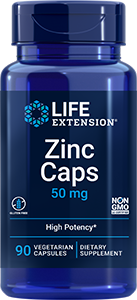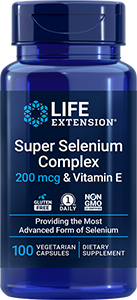
Newsletter
Newsletter
Why higher vitamin D intake may be important for prediabetics

Many doctors recommend vitamin D serum levels of 20-30 nanograms per milliliter (ng/mL)—but for people with prediabetes, that may not be enough. A recent study found that vitamin D serum levels of 40 ng/mL or higher were linked to protective effects against the development of diabetes.1 To achieve an optimal level, higher doses of vitamin D may be needed, according to the study's authors. (Life Extension's optimal vitamin D range is 50 to 80 ng/mL.)
The study analyzed data from 2,362 prediabetic men and women who participated in a trial that examined the association between intake of 4,000 IU of vitamin D and the risk of developing diabetes. Serum 25-hydroxyvitamin D levels were measured prior to a 2.5-year median follow-up period and were repeated each year.
In addition to looking at vitamin D serum levels and diabetes, researchers set out to determine whether overweight or obese prediabetics and people of color with prediabetes have different associations between vitamin D levels and diabetes risk compared with normal weight or Caucasian prediabetics. The conclusion? While both groups benefited from vitamin D intake, Whites benefitted more. Caucasian and Black participants whose average annual vitamin D levels measured during the trial were 40 ng/mL or higher had significantly lower risks—58% and 49% lower, respectively—of developing diabetes than those whose levels were 20 ng/mL to less than 30 ng/mL. A serum vitamin D level of 40 ng/mL or more was also significantly protective for participants who had body mass indexes of less than <40 kg/m2. The findings were published on March 29, 2023, in the American Journal of Clinical Nutrition.
Similar findings in a recent review and meta-analysis published in the Annals of Internal Medicine suggested that high vitamin D levels may be optimal for diabetes prevention.2 The review found that vitamin D intake overall reduced the risk for diabetes by 15%. In those in the vitamin D group who maintained a serum 25-hydroxyvitamin D level of at least 50 ng/mL during the trial, compared with 20 to 29 ng/mL, relative risk of diabetes risk was reduced by 76%. Vitamin D intake conferred a 30% chance of restoring normal glucose regulation. Vitamin D was well-tolerated, with no increased risk of adverse events.
Products
Apply What You’ve Learned: Vitamin D Intake
- Studies have not established the amount of vitamin D needed to raise blood levels by a specified amount.3 It is suggested to have your blood tested for serum 25-hydroxyvitamin D [25(OH)D] to make sure your levels are within a healthy range and to increase intake of the vitamin as needed. Retesting can help determine whether your supplement regimen is adequate.
- Insufficient vitamin D levels of less than 20 nanograms per milliliter (ng/mL) are not uncommon and should be corrected.4
- Vitamin D is important for the bones, immune system, cancer prevention, healthy blood pressure, teeth, cardiovascular system, brain, and more.5-8
- While exposure to the sun's ultraviolet (UV) rays is well known as a way of obtaining vitamin D, the American Academy of Dermatology does not recommend getting vitamin D from sun exposure or indoor tanning. Unprotected exposure to UV rays is a known risk factor for skin cancer, including potentially fatal melanoma.9
References
- Chatterjee R et al. Am J Clin Nutr. 2023 Mar 29;S0002-9165(23)46304-6.
- Pittas AG et al. Ann Intern Med. 2023 Mar;176(3):355-363.
- Ramasamy I. Clin Biochem Rev. 2020 Dec;41(3):103-126.
- Bouillon R et al. Best Pract Res Clin Endocrinol Metab. 2018 Oct;32(5):669-684.
- Khazai N et al. Curr Rheumatol Rep. 2008 Apr;10(2):110-7.
- Uwitonze AM et al. J Steroid Biochem Mol Biol. 2018 Jan;175:190-194.
- Mheid IA et al. J Am Coll Cardiol. 2011 Jul 5;58(2):186-92.
- Goodwill AM et al. J Am Geriatr Soc. 2017 Oct;65(10):2161-2168.
- “Vitamin D stats and facts.” American Academy of Dermatology. https://www.aad.org/media/stats-vitamin-d
Featured Life Extension Magazine® Article
Plant Extracts Improve Women's Urinary Symptoms
By Michael Downey
Frequent urination, nighttime urination, urinary urgency and incontinence often make their appearance in women over the age of 40. To address this common problem, naturopath Tracey Seipel researched herbs traditionally used to treat bladder concerns. She developed a combination of horsetail, lindera and three-leaf caper that significantly benefited 79% of the women who received it during an eight-week trial.
Read Full Article
What's Hot
Health Concern
Greater intake of vitamin D linked to lower risk of diabetes among prediabetics
A review and meta-analysis published on February 6, 2023, in Annals of Internal Medicine found a 15% lower risk of developing type 2 diabetes among prediabetic men and women who received vitamin D supplements.

Diabetes and Glucose Control
This protocol explains the difference between type 1 and type 2 diabetes, and how elevated blood sugar, even within the normal range, can damage tissues throughout the body.
Related Life Extension Magazine® Articles

Whole-Body Health with Vitamin D
Scientists have discovered vitamin D receptors in nearly every cell in the body that help protect the brain and heart, while increasing lifespan.

Vitamin K Promotes Healthy Blood Sugar Metabolism
A recent study found that vitamin K can reduce the risk of developing type II diabetes by 51% and inhibit metabolic syndrome.
Life Extension Magazine® Issue Now Online
A remarkable number of healthy-longevity findings have been published over the past 18 months.





